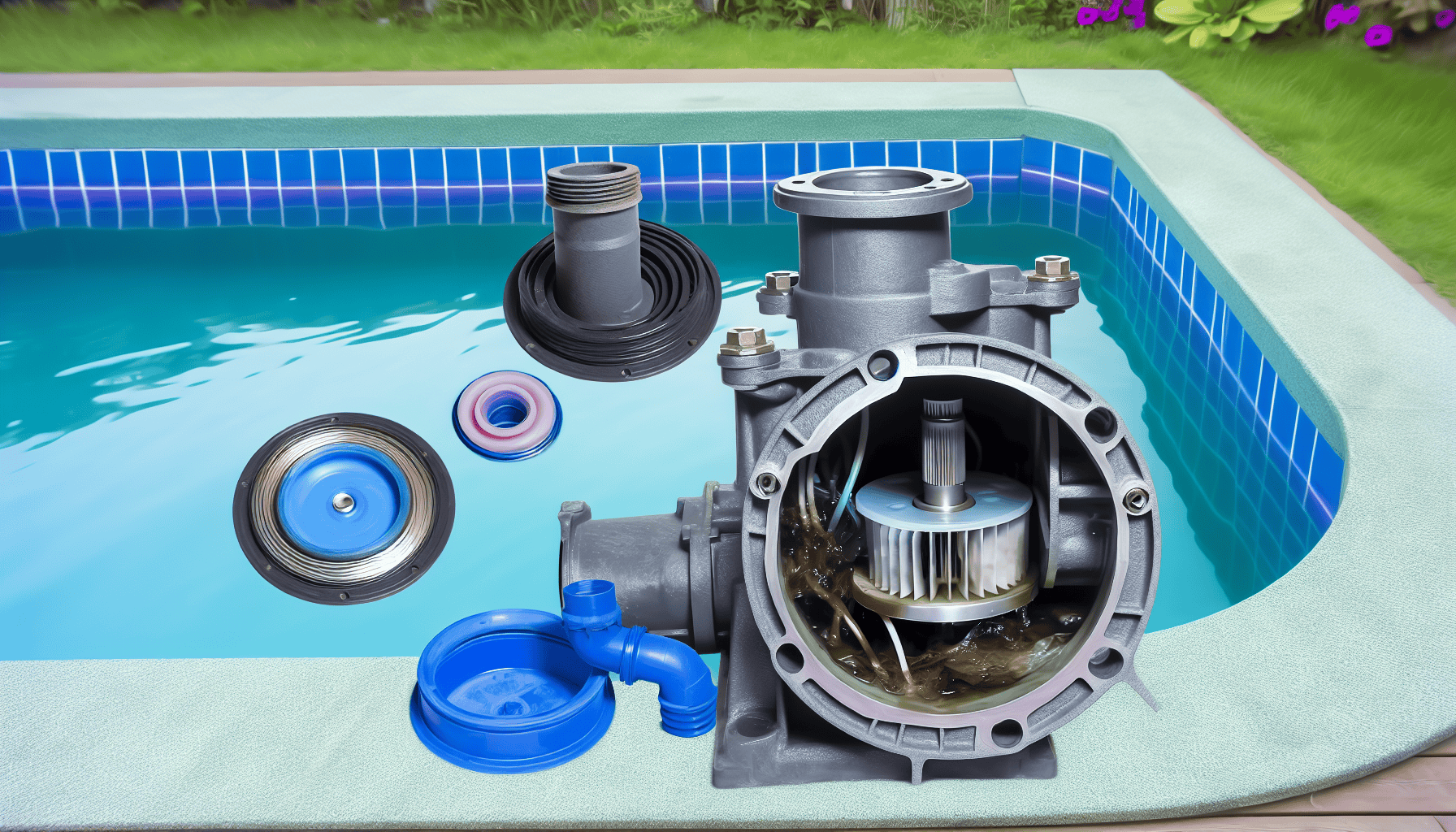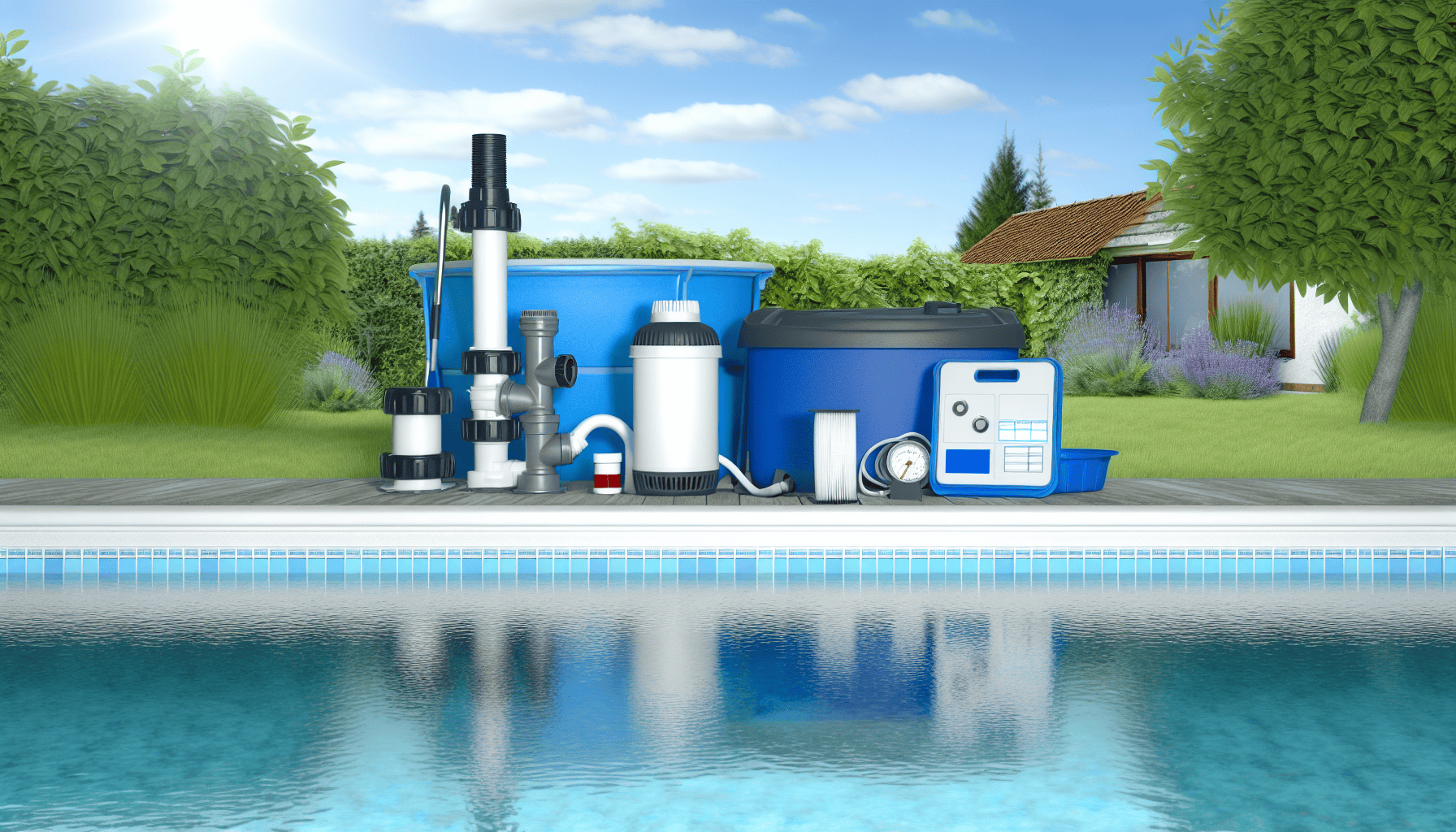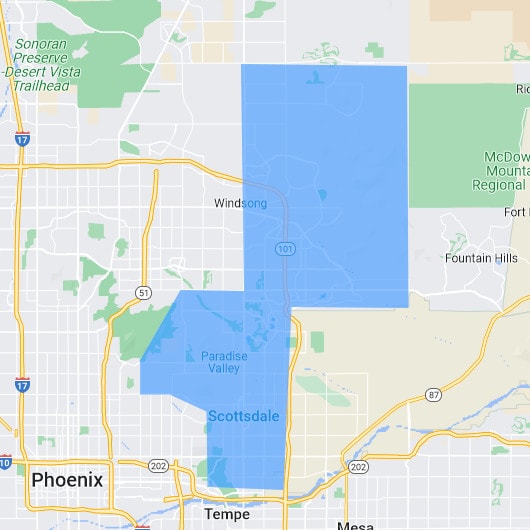DIY Pool Service For Scottsdale Homes
Welcome to DIY Pool Service Tips for Scottsdale Homeowners
Whether you’re new to pool ownership or looking to refine your maintenance routine, this guide is for you. We’ve compiled essential DIY tips and tricks covering everything from basic cleaning and chemical balancing to algae treatment and equipment repair. As you dive into this guide, expect practical advice to keep your pool sparkling clean, safe, and ready for endless enjoyment. Let’s ensure your backyard oasis remains a source of pride and pleasure with maintenance tips that are as sunny as our Scottsdale climate.
Table of Contents
Understanding Your Pool Type and Needs
Before diving into DIY pool maintenance, it’s essential to understand your pool’s specific needs. Pools come in various shapes, sizes, and types, each requiring a unique care approach. The care varies significantly here in Scottsdale, from traditional chlorine pools to saltwater systems. Identifying your pool type is the first step toward effective maintenance.
Chlorine vs. Saltwater Pools
Knowing whether you have a chlorine or saltwater pool influences the maintenance techniques you’ll use:
- Chlorine Pools: Regular chemical tests and chlorine adjustments are required to keep the water clean and safe.
- Saltwater Pools: They need less frequent chemical adjustments but require monitoring of the salt cell generator.
Additionally, understanding your pool’s material—concrete, vinyl, or fiberglass—helps you select the right cleaning tools and chemicals to prevent damage.
Seasonal Needs
Scottsdale’s climate plays a significant role in pool maintenance. During hot summer, pools may need more frequent cleaning and chemical adjustments due to increased use and evaporation. Conversely, maintenance needs may decrease during cooler months, but keeping the water balanced and equipment running is crucial to prevent algae growth and circulation issues.
Equipment Check
Regular maintenance of your pool’s pump, filter, and heater ensures efficient operation. A malfunctioning pump or filter can lead to various pool problems, from cloudy water to algae blooms. Keeping an eye on these essentials helps in the early detection of potential issues.
Understanding your pool’s specific needs sets a solid foundation for DIY maintenance. It helps plan a weekly pool maintenance schedule tailored to your pool’s type, material, and seasonal use. For more detailed guidance, refer to our comprehensive Scottsdale pool maintenance guide. And remember, if you encounter problems beyond DIY fixes, don’t hesitate to call a professional. Pool maintenance is not just about keeping the water clean; it’s about ensuring a safe and enjoyable swimming experience for everyone.
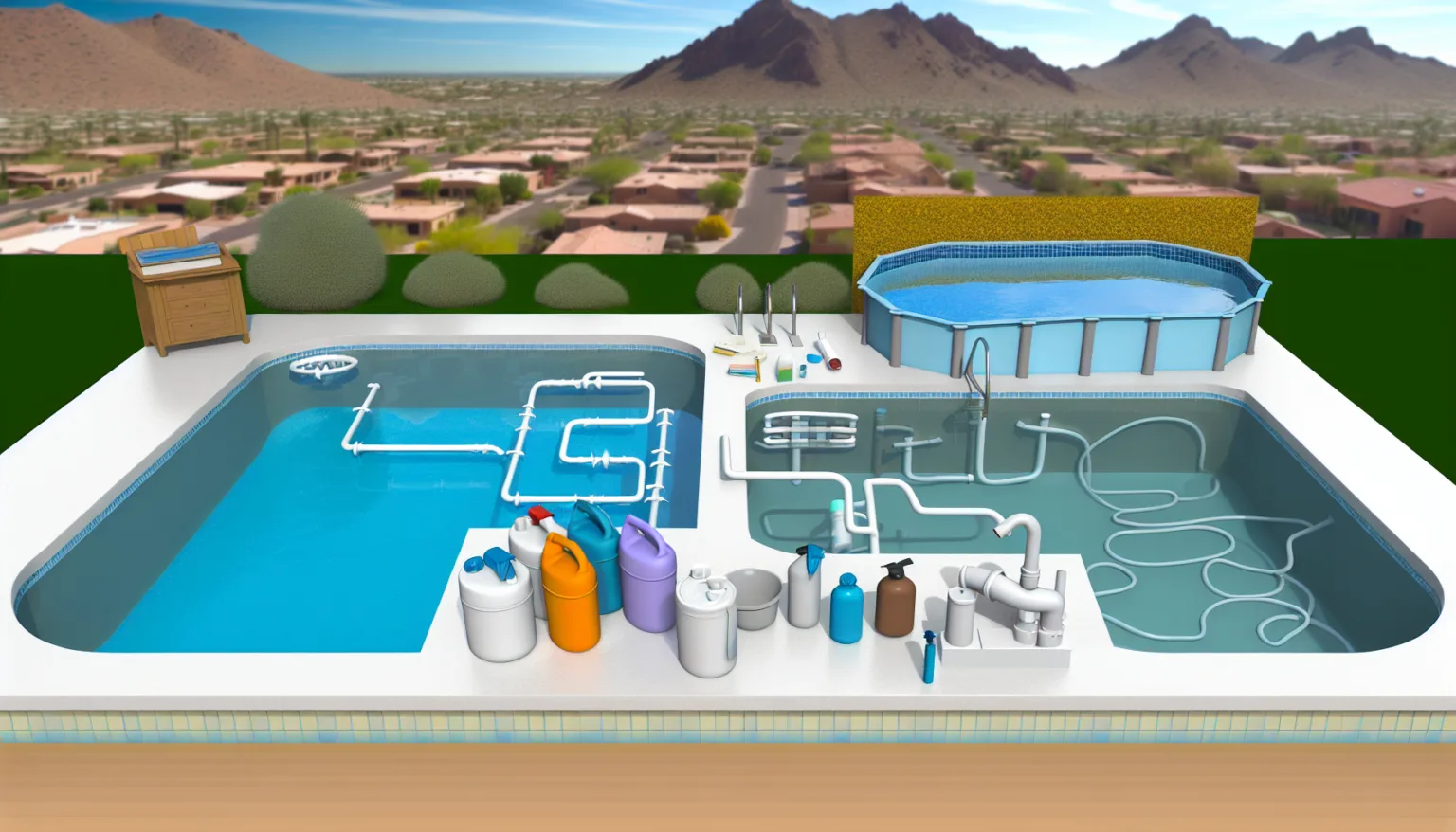
Scottsdale Pool Cleaning Guide
Maintaining a sparkling, clean pool in Scottsdale doesn’t have to be a chore if you know the right steps. A routine cleaning schedule is the backbone of healthy pool water. Here’s a step-by-step guide to keeping your pool in top shape.
Weekly Maintenance Checklist
- Test Water Chemistry: Use a reliable testing kit to check your pool’s pH, chlorine levels, and alkalinity at least once a week. Aim for a pH between 7.4 and 7.6 to prevent irritation and protect pool equipment.
- Balance Chemicals: Adjust your chemicals accordingly based on your testing results. Chlorine tablets are a convenient way to maintain chlorine levels, while baking soda can increase alkalinity.
- Clean Pool Surfaces: Use a pool brush to scrub your pool’s walls, floor, and steps. This prevents algae buildup and calcium deposits.
- Skim and Vacuum: Regularly skimming the pool’s surface and vacuuming the bottom helps remove debris and prevents sediment from building up.
- Filter Maintenance: Regularly clean or backwash your pool’s filter to ensure efficient operation. A clean filter is crucial for crystal-clear water.
Monthly Tasks
- Inspect Equipment: Check your pool pump, heater, and other equipment for signs of wear or malfunctions. Early detection of potential issues can prevent costly repairs.
- Shock the Pool: Even with regular chlorine treatment, giving your pool a monthly shock treatment is beneficial to kill any lingering bacteria or algae spores.
- Calcium Hardness: Test for calcium hardness to prevent plaster damage or cloudy water. Scottsdale’s hard water may require regular adjustment of calcium levels.
Aside from these DIY tips, professional help is always available for more complicated issues or routine checks. For example, our pool equipment repair services can assist with everything from a faulty pump to a complete overhaul. Also, check out the Centers for Disease Control and Prevention for extra health and safety guidelines. By following these steps, you’re not just cleaning your pool; you’re ensuring a safe, enjoyable environment for everyone.
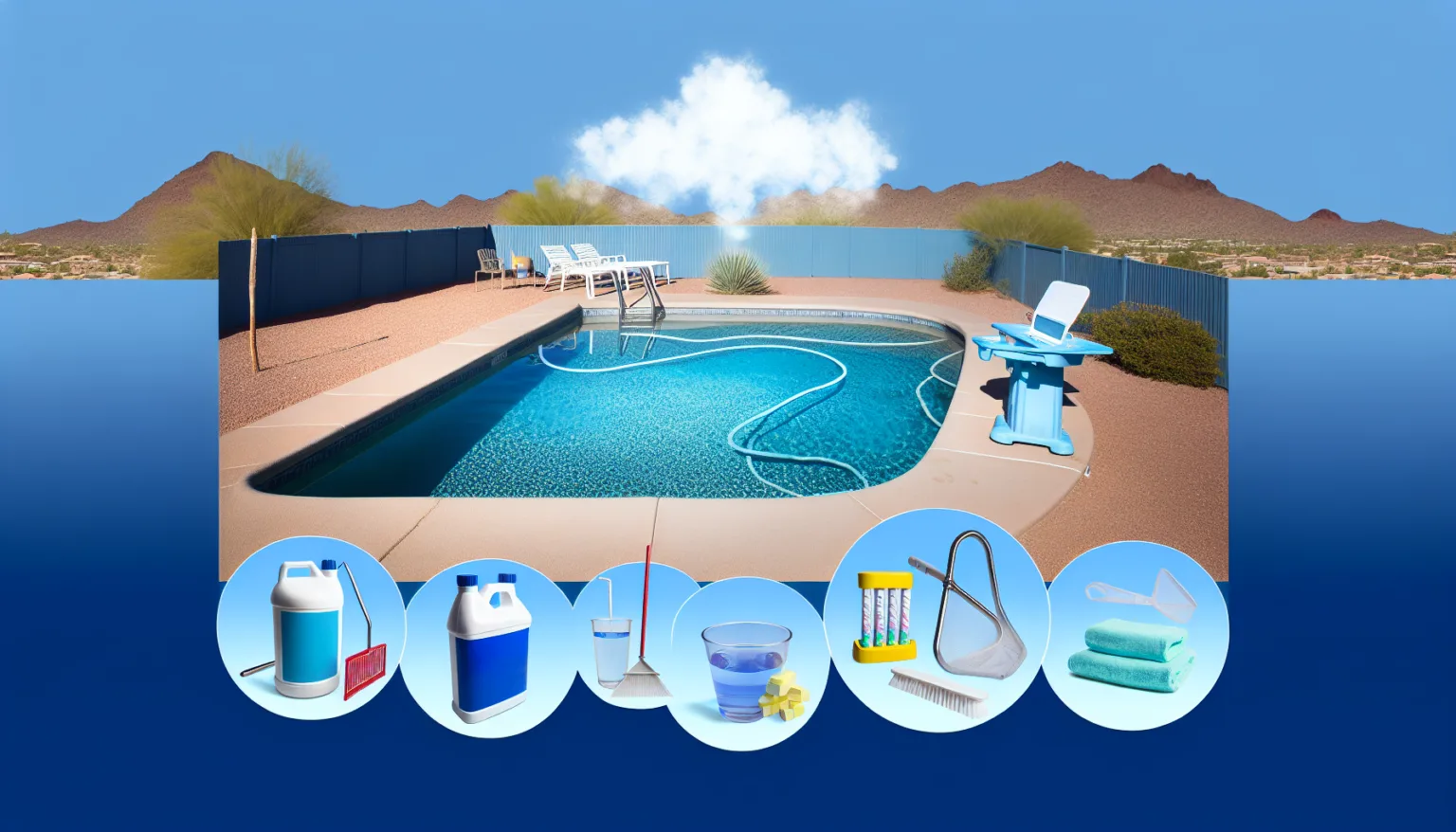
Pool Chemical Balance DIY
Maintaining the right chemical balance in your pool is crucial for the water’s clarity and swimmers’ health and safety. Here’s how Scottsdale homeowners can tackle pool chemical balancing themselves, ensuring their pool remains a refreshing oasis.
Understanding Pool Chemistry
First things first, familiarizing yourself with the key components of pool chemistry is essential:
- pH Level: This indicates how acidic or alkaline your pool water is. A balanced pH (7.4-7.6) protects the pool equipment and ensures chlorine’s effectiveness.
- Chlorine: The sanitizer that keeps your pool water free from bacteria and algae. Its effectiveness is pH-dependent.
- Alkalinity: It acts as a pH buffer, preventing wide pH swings. Ideal levels are between 100 and 150 ppm.
- Calcium Hardness: Important, especially in Scottsdale’s hard water. It helps prevent plaster damage. Aim for 200-250 ppm in vinyl pools and 250-450 ppm in concrete pools.
DIY Chemical Balancing Steps
- Test Your Pool Water: Use a testing kit regularly to monitor your pool’s pH, chlorine, alkalinity, and calcium hardness levels.
- Adjust pH: If the pH level is off, use pH increasers or reducers accordingly. Make small adjustments and retest.
- Regulate Chlorine: To keep chlorine levels in check, saltwater pools should be treated with chlorine tablets or a salt chlorine generator.
- Manage Alkalinity: Use baking soda to raise alkalinity or muriatic acid to lower it, ensuring it acts as an effective pH buffer.
- Correct Calcium Hardness: Add calcium chloride to increase hardness or dilute your pool water to decrease it.
Proper chemical balance maintenance can initially seem daunting, but it becomes manageable with diligence and routine checks. For more complex issues or in-depth guidance, consider our specialized algae treatment service in Scottsdale. Additionally, the Environmental Protection Agency offers resources on healthy swimming environments. Keeping your pool chemicals balanced ensures everyone involved a safer and more enjoyable swimming experience.
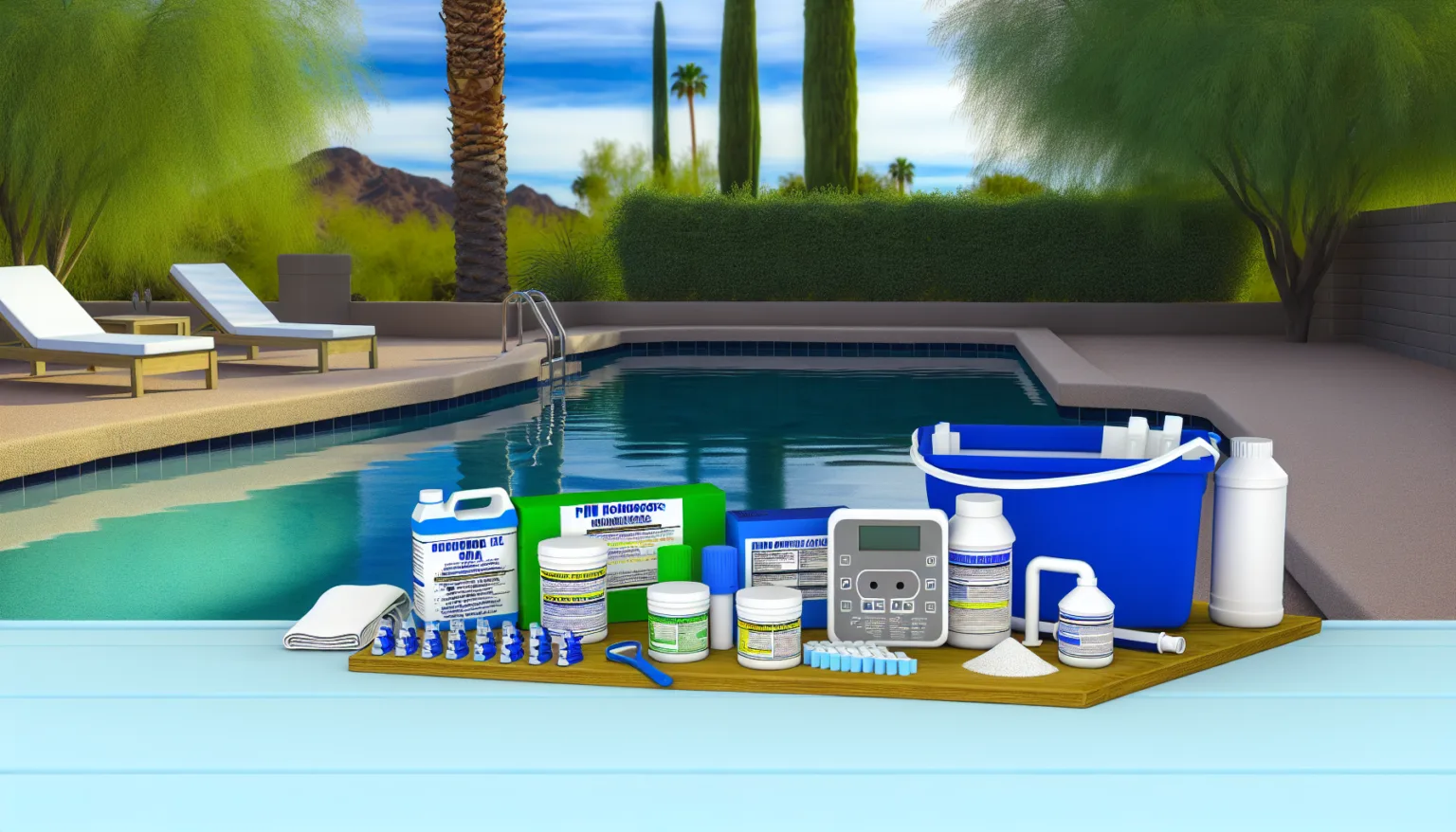
Algae Treatment Home Pools
Algae can be a nuisance for pool owners in Scottsdale, turning a clean, inviting pool into an unsightly green mess. Fortunately, you can prevent and treat algae in your home pool with consistent care and the right approach.
Preventing Algae Growth
- Maintain Chemical Balance: To deter algae growth, keep your pool’s pH, chlorine levels, and alkalinity within ideal ranges.
- Regular Cleaning: Brushing and vacuuming your pool walls and floor weekly prevents algae from latching on.
- Run the Filter: Ensure your pool’s filter runs daily to keep the water clean and circulating.
Identifying and Treating Algae
Different algae types require specific treatments:
- Green Algae: The most common type. Quickly treat with a pool shock and algaecide, then brush and vacuum your pool thoroughly.
- Black algae are tough and stubborn: To remove them, use a stainless steel brush and apply a strong algaecide designed for black algae.
- Mustard Algae: It looks like sand or dirt. Treat it with pool shock and ensure your pool equipment and toys are clean, as they can spread easily.
For persistent or severe algae problems, our algae treatment service in Scottsdale provides expert help. For health-related info on pool algae, check out the Centers for Disease Control and Prevention. Remember, prompt action is key to managing algae. You can keep your pool clear and algae-free by staying vigilant with maintenance and treatment.
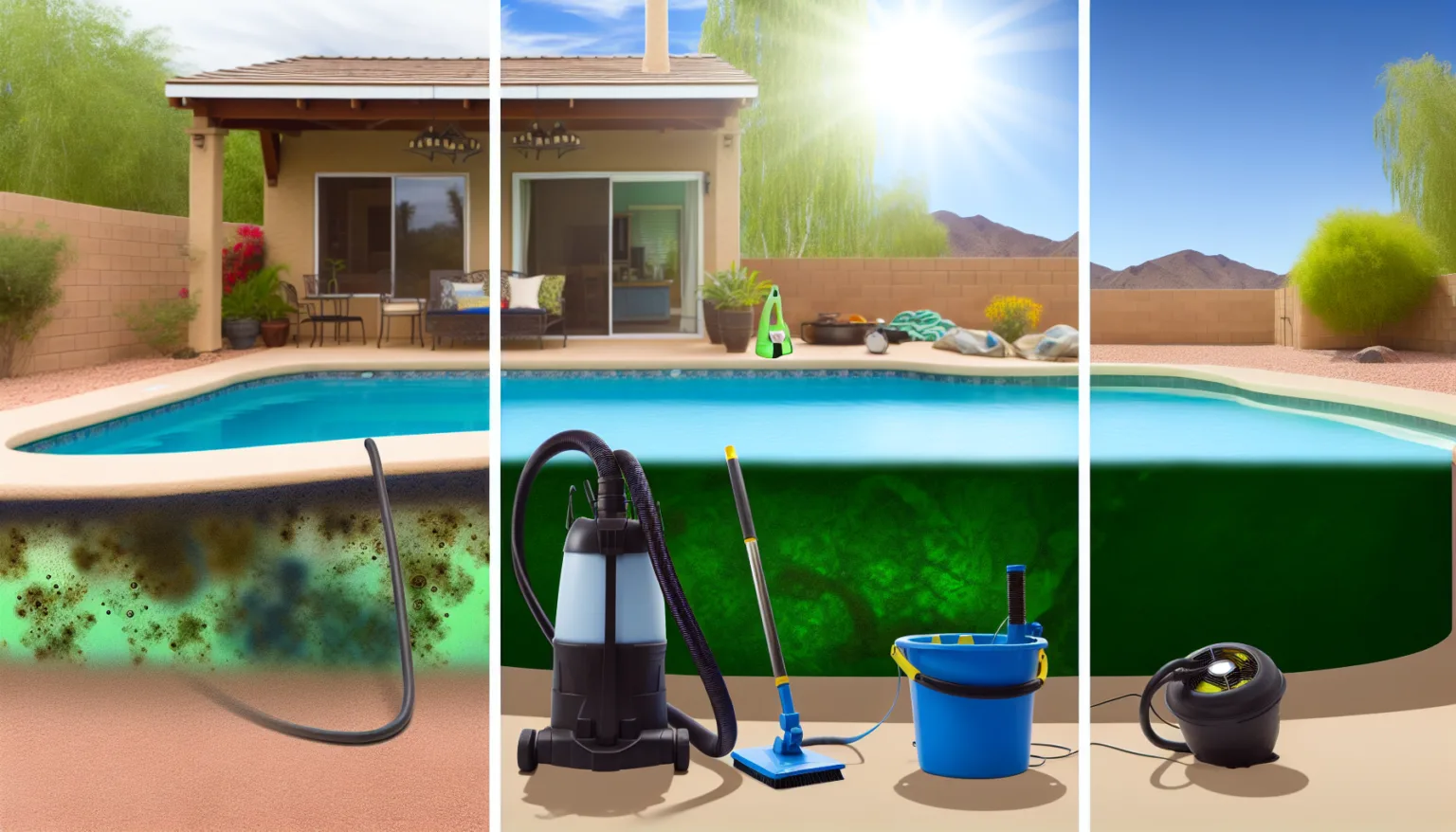
Pool Equipment Repair Tips
Efficient pool equipment is vital for your pool’s cleanliness and overall health. Scottsdale homeowners can tackle common pool equipment issues themselves, saving time and money. Here’s how to address some typical problems.
Dealing with a Faulty Pump
- Check for Clogs: Clear debris from the pump basket and skimmer to ensure unobstructed water flow.
- Inspect for Leaks: Examine the pump for signs of water leakage, which could indicate a worn seal or gasket.
- Listen for Odd Noises: Grinding or screeching sounds can signal bearing issues. Lubricating or replacing the bearings might be necessary.
Fixing a Cloudy Pool
- Check the Filter: A malfunctioning filter can lead to cloudy water. Backwash or clean your filter according to the manufacturer’s instructions.
- Maintain Water Balance: Ensure your pool’s chemical levels, including pH and chlorine, are within their ideal ranges.
- Increase Circulation: Improve your pool’s circulation by running the pump longer and adjusting the return jets for better water movement.
Heater Troubleshooting
- Verify Gas and Power: Ensure your gas pool heater has a proper gas supply and that your electric heater receives power.
- Examine the Thermostat: Set the thermostat to a few degrees above the current water temperature to test if the heater kicks in.
- Inspect for Blockages: Clear obstructions in the heater’s vents or exhaust to prevent overheating and inefficiency.
While these tips can help solve minor issues, some problems may require professional expertise. Attempting complex repair work without the right knowledge can cause more harm than good. For those instances, it’s wise to seek help from a reliable professional. For broader issues or maintenance needs, look at the U.S. Department of Energy’s guide on installing and maintaining swimming pool and spa equipment. Regular maintenance and timely repairs ensure your pool remains a rejuvenating retreat for years.
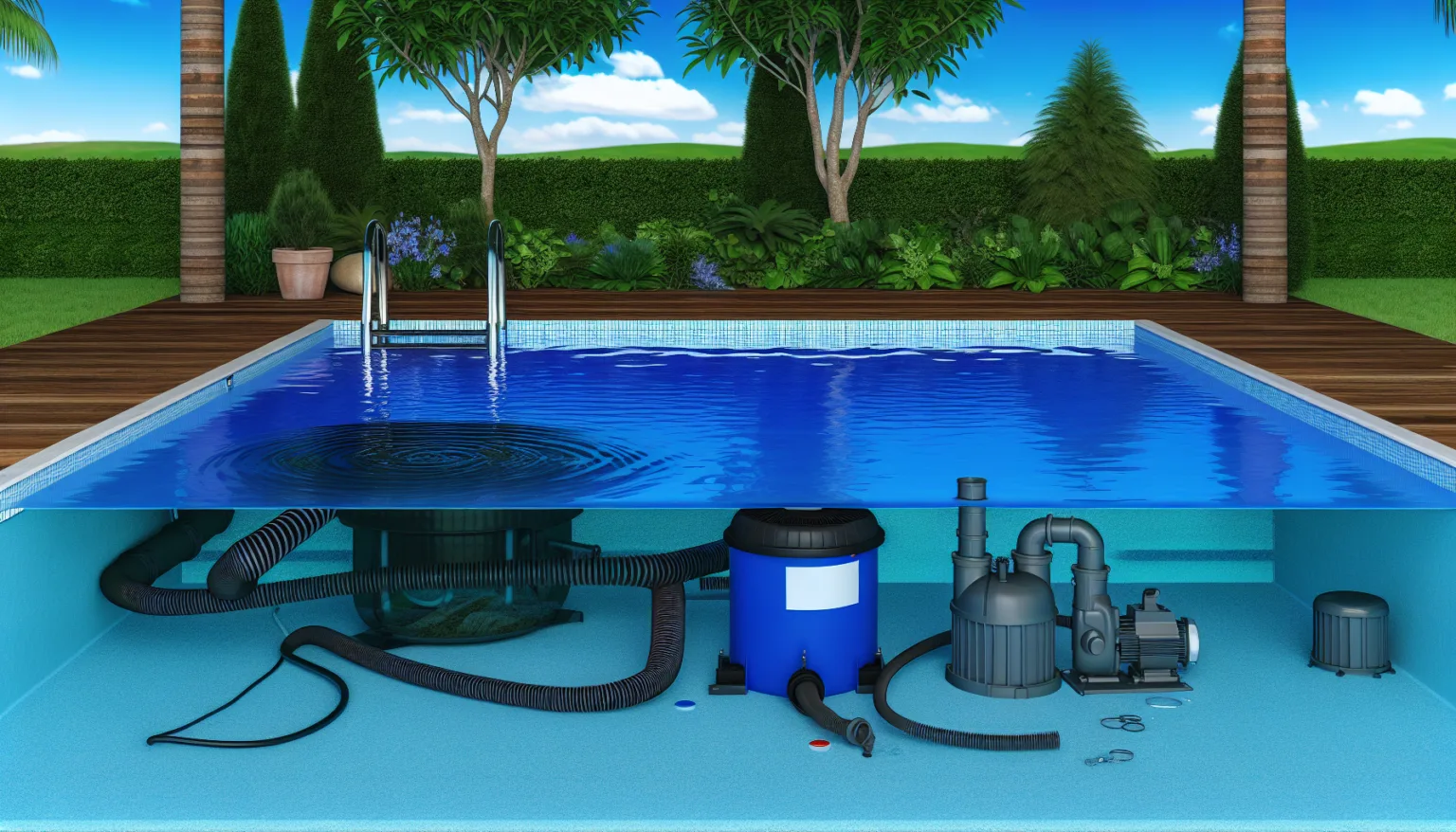
Salt Water Pool Care Scottsdale
Caring for a saltwater pool differs slightly from traditional chlorine pools, but it’s just as crucial for maintaining a healthy swimming environment. Here’s a guide to help Scottsdale homeowners keep their saltwater pools pristine.
Understanding Your Saltwater System
The heart of a saltwater pool is the salt chlorine generator, which converts salt into chlorine, keeping your pool sanitized without adding chlorine regularly. This system requires specific attention:
- Monitor Salt Levels: Too much or too little salt affects the efficiency of chlorine production. Regularly check the salt level to ensure it’s within the 2700 to 3400 ppm range.
- Inspect the Cell: The chlorine generator cell can accumulate calcium and other deposits, hindering performance. Clean the cell based on the manufacturer’s instructions.
- Balance the Water: Even with a salt water system, it’s still essential to test and balance your pool’s pH, alkalinity, and calcium hardness levels regularly.
Regular Maintenance Tips
- Clean Regularly: Skim, brush, and vacuum your pool weekly to keep it free of debris and prevent algae buildup.
- Check the Filter: Regularly clean or backwash your pool’s filter to ensure the water remains clear and circulation is not impeded.
- Stay on Top of Repairs: Monitor your pool’s equipment and address any issues promptly to avoid disruptions in your saltwater system’s operations.
Maintaining a saltwater pool in Scottsdale requires regular attention but is undoubtedly rewarding. Following these guidelines, you can enjoy your saltwater pool’s soft, gentle water with minimal chemical use. Our saltwater pool service offers comprehensive care tailored to Scottsdale’s climate for homeowners considering making the switch or seeking more in-depth assistance. Remember, the key to a sparkling pool is consistent care and prompt attention to any issues.
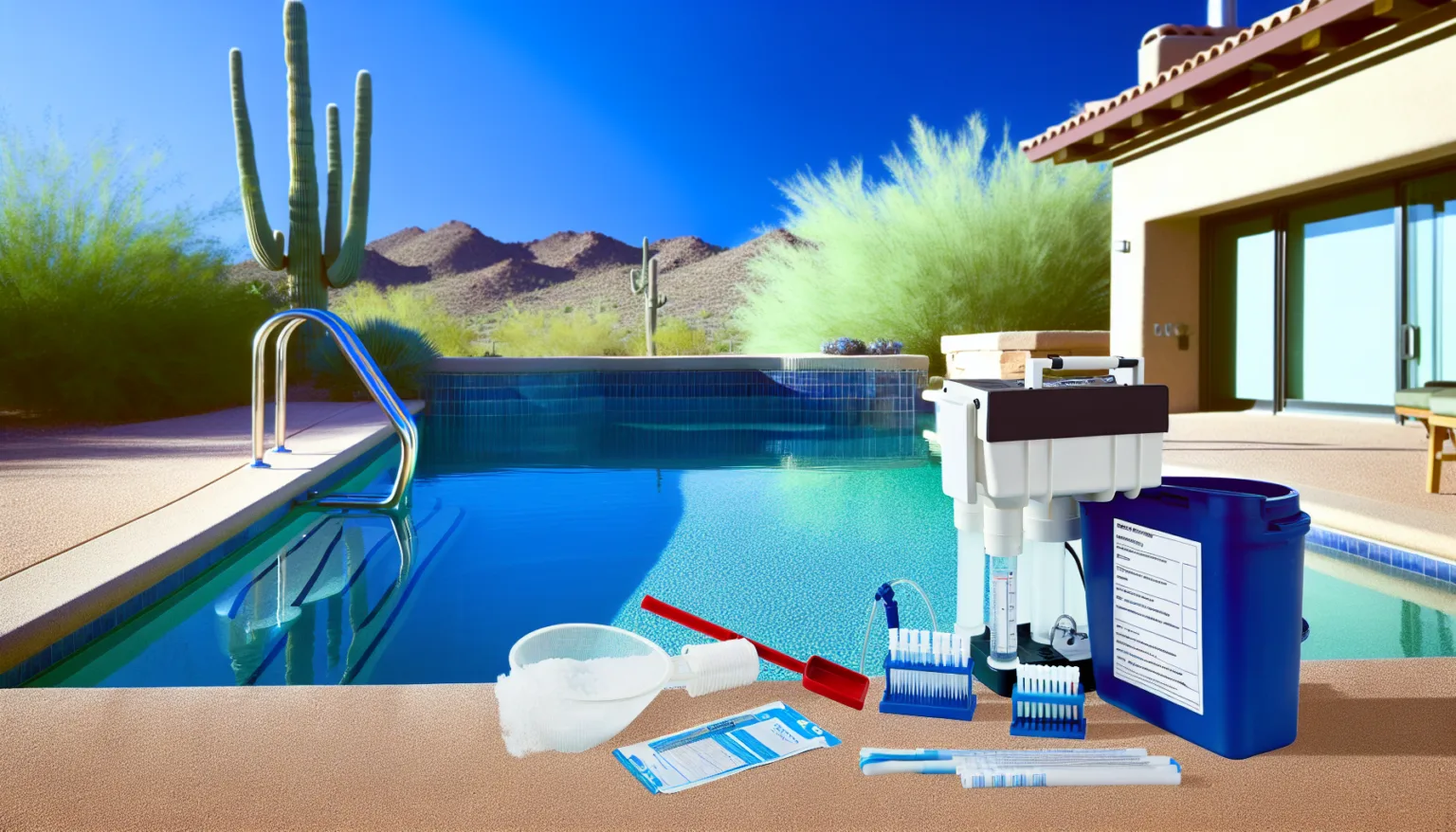
Pool Skimming Techniques
Keeping your pool free of debris improves its appearance and water quality. Regular skimming is a fundamental yet effective method for achieving this. Here are some tips for mastering the art of pool skimming in Scottsdale homes.
Choosing the Right Skimmer
The right tools make a difference:
- Deep Net Skimmer: Ideal for removing debris from the bottom.
- Flat Skimmer: Perfect for floating debris like leaves and bugs.
Effective Skimming Techniques
To skim efficiently, follow these practices:
- Regular Timing: Skim your pool daily, preferably in the morning, to catch debris before it sinks.
- Use Long Strokes: Gently glide the skimmer across the surface in long, steady strokes.
- Work the Edges: Debris often accumulates along the pool edges, so give them extra attention.
- Empty the Basket: Regularly clean your skimmer basket to maintain strong water flow.
Maintenance and Storage
Take good care of your skimming tools:
- Clean After Use: Rinse the skimmer net to remove chlorine or chemicals.
- Store Properly: Keep it out of the sun to prevent damage from UV rays.
Skimming is a simple yet crucial part of pool maintenance that helps keep your water inviting and safe for swimming. Combine this routine with regular weekly pool maintenance to ensure your Scottsdale pool remains a refreshing escape from the heat. Skimming is pivotal in preventive care, as it removes potential contaminants before they can affect your pool’s water quality.
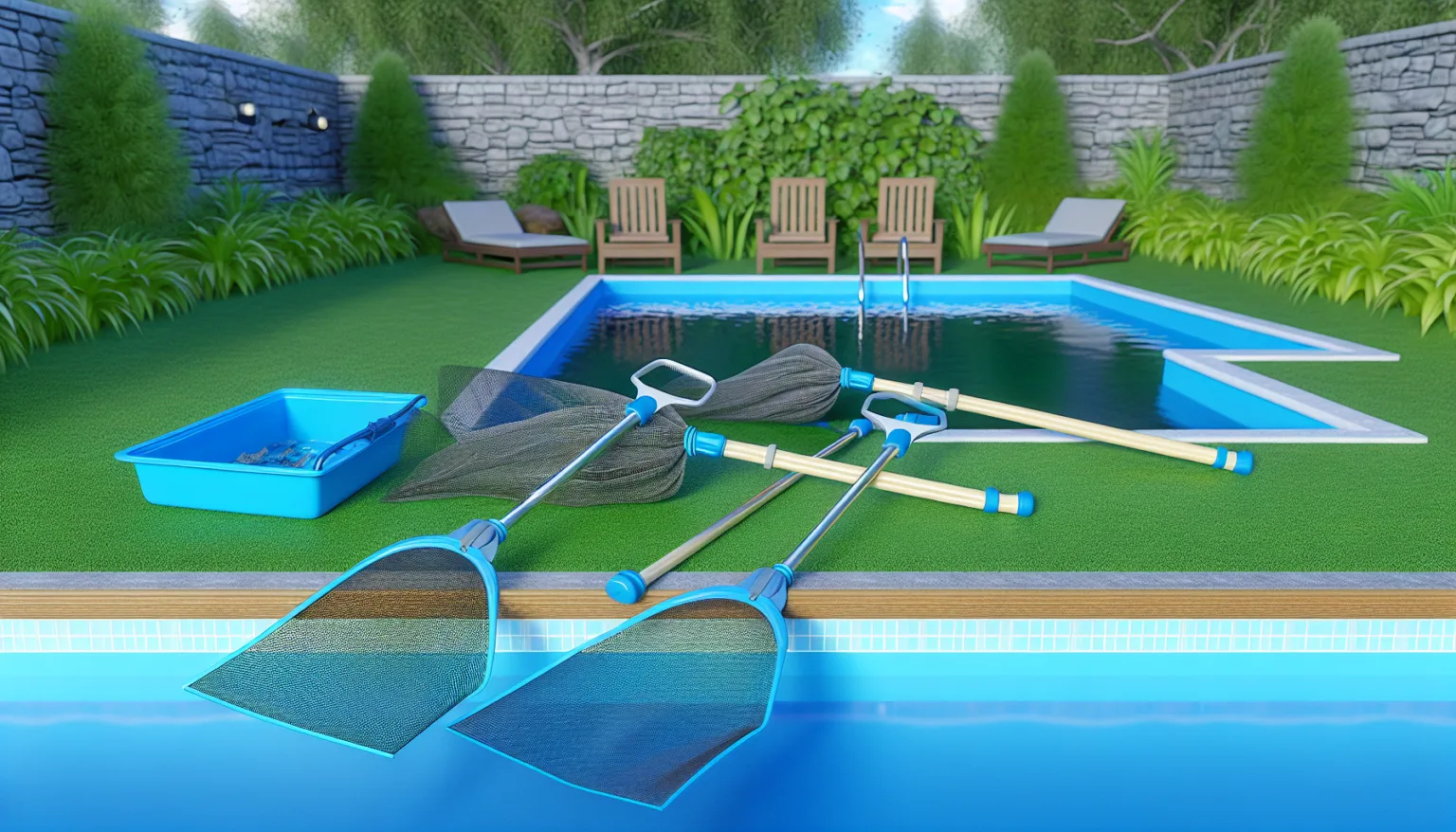
Choosing the Right Pool Supplies
Having the right pool supplies is essential for maintaining your pool’s health and cleanliness. Here’s a rundown of must-have products and equipment for Scottsdale pool owners, ensuring your pool care routine is efficient and effective.
Essential Pool Chemicals
- Sanitizers: Chlorine or bromine to keep the water free from bacteria and algae.
- pH balancers: To adjust the acidity or alkalinity of your pool water.
- Algaecides: Prevent and treat algae growth, a common issue in warmer climates.
- Shock treatments: For periodic intense cleaning to complement your regular maintenance.
Cleaning Tools and Equipment
- Automatic Pool Cleaner: Saves time and effort in keeping the pool’s floor and walls clean.
- Pool Skimmer: Essential for removing leaves and other floating debris.
- Brush and Vacuum: For scrubbing walls and manual vacuuming of debris settled at the bottom.
- Water Testing Kit: This is crucial for regularly monitoring your pool’s chemical balance.
Maintenance and Safety Gear
- Pool Cover: Minimizes evaporation and removes debris when the pool is unused.
- Life-saving Equipment: A safety ring or floatation device is prudent even in a home setup.
Investing in high-quality pool supplies is vital for ease of maintenance and ensuring your pool remains a safe, clean, and inviting space. For guidance on equipment needs specific to saltwater systems, our saltwater pool service page offers detailed insights. Also, consider familiarizing yourself with the Pool Safely campaign for tips on ensuring your pool area is safe for everyone. Equipping yourself with the right tools and knowledge is the first step toward a hassle-free pool ownership experience.
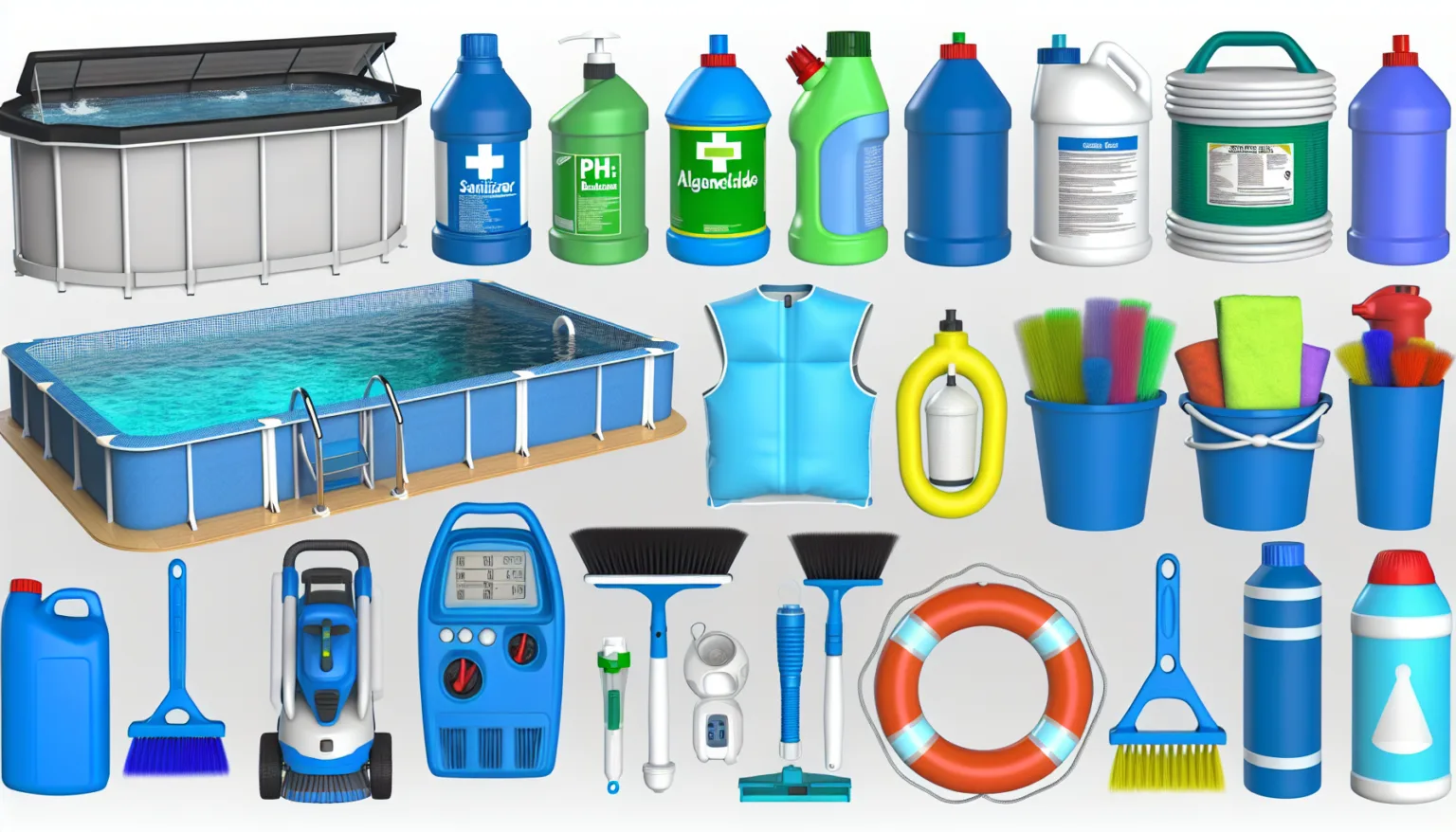
FAQs: DIY Pool Service Tips for Scottsdale Homeowners
How often should I test my pool water?
Testing your pool water weekly is a good practice to maintain proper chemical balance. Consider testing more frequently during the summer or periods of heavy use to keep up with changing conditions.
What’s the best way to treat pool algae?
Algae treatment starts with prevention—maintain balanced water chemistry and clean your pool regularly. Using a quality algaecide and brushing your pool thoroughly can help for existing algae. For tough cases, our algae treatment service offers expert assistance.
Can I repair pool equipment myself?
Many minor repairs, like unclogging filters or replacing O-rings, can be DIY projects. However, professional service is recommended for complex issues like pump or heater malfunctions to avoid further damage.
Is saltwater pool maintenance easier than chlorine pool maintenance?
While saltwater pools generally require less day-to-day maintenance because they produce their chlorine, they still need regular salt levels and pH balance monitoring. Both types of pools require diligent care, but the approach differs.
How do I know if my pool chemicals are balanced?
The best way to ensure your chemicals are balanced is to use a testing kit to check pH, chlorine, alkalinity, and calcium hardness levels. Our Scottsdale pool maintenance guide provides ideal ranges for each parameter.
What’s the safest way to store pool chemicals?
Store pool chemicals in a cool, dry place away from direct sunlight and out of reach of children and pets. Ensure they’re stored in original containers with labels intact, and never mix different chemicals.
Conclusion: Keeping Your Pool Pristine with DIY Care
With these DIY pool service tips, Scottsdale homeowners can confidently keep their pools in top-notch condition. Remember, regular maintenance not only preserves the beauty and functionality of your pool but also ensures a safe, healthy swimming environment for your family and guests. By staying diligent with chemical balancing, cleaning, equipment care, and algae prevention, you’re setting the stage for endless fun and relaxation in your backyard oasis. And if you ever encounter a challenge beyond DIY scope, remember that professional help is just a phone call away. Dive into pool care enthusiastically and watch your efforts pay off in crystal clear, inviting waters all year round.


